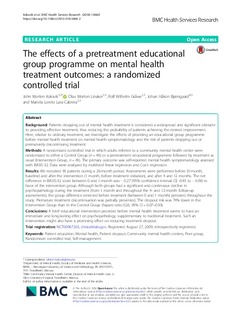| dc.contributor.author | Koksvik, John Morten | |
| dc.contributor.author | Linaker, Olav Morten | |
| dc.contributor.author | Gråwe, Rolf W. | |
| dc.contributor.author | Bjørngaard, Johan Håkon | |
| dc.contributor.author | Lara Cabrera, Mariela Loreto | |
| dc.date.accessioned | 2019-09-03T06:44:36Z | |
| dc.date.available | 2019-09-03T06:44:36Z | |
| dc.date.created | 2018-10-01T14:06:08Z | |
| dc.date.issued | 2018 | |
| dc.identifier.citation | BMC Health Services Research. 2018, 18:665 1-10. | nb_NO |
| dc.identifier.issn | 1472-6963 | |
| dc.identifier.uri | http://hdl.handle.net/11250/2612116 | |
| dc.description.abstract | Background
Patients dropping out of mental health treatment is considered a widespread and significant obstacle to providing effective treatment, thus reducing the probability of patients achieving the desired improvement. Here, relative to ordinary treatment, we investigate the effects of providing an educational group programme before mental health treatment on mental health symptomatology and the risk of patients dropping out or prematurely discontinuing treatment.
Methods
A randomized controlled trial in which adults referred to a community mental health center were randomized to either a Control Group (n = 46) or a pretreatment educational programme followed by treatment as usual (Intervention Group, n = 45). The primary outcome was self-reported mental health symptomatology assessed with BASIS-32. Data were analyzed by multilevel linear regression and Cox’s regression.
Results
We recruited 93 patients during a 26-month period. Assessments were performed before (0 month, baseline) and after the intervention (1 month, before treatment initiation), and after 4 and 12 months. The net difference in BASIS-32 score between 0 and 1-month was − 0.27 (95% confidence interval CI] -0.45 to − 0.09) in favor of the intervention group. Although both groups had a significant and continuous decline in psychopathology during the treatment (from 1 month and throughout the 4- and 12-month follow-up assessments), the group difference detected before treatment (between 0 and 1 month) persisted throughout the study. Premature treatment discontinuation was partially prevented. The dropout risk was 74% lower in the Intervention Group than in the Control Group (hazard ratio 0.26, 95% CI = 0.07–0.93).
Conclusions
A brief educational intervention provided before mental health treatment seems to have an immediate and long-lasting effect on psychopathology, supplementary to traditional treatment. Such an intervention might also have a promising effect on reducing treatment dropout. | nb_NO |
| dc.language.iso | eng | nb_NO |
| dc.publisher | BMC (part of Springer Nature) | nb_NO |
| dc.rights | Navngivelse 4.0 Internasjonal | * |
| dc.rights.uri | http://creativecommons.org/licenses/by/4.0/deed.no | * |
| dc.title | The effects of a pretreatment educational group programme on mental health treatment outcomes: A randomized controlled trial | nb_NO |
| dc.type | Journal article | nb_NO |
| dc.type | Peer reviewed | nb_NO |
| dc.description.version | publishedVersion | nb_NO |
| dc.source.pagenumber | 1-10 | nb_NO |
| dc.source.volume | 18:665 | nb_NO |
| dc.source.journal | BMC Health Services Research | nb_NO |
| dc.identifier.doi | 10.1186/s12913-018-3466-2 | |
| dc.identifier.cristin | 1616795 | |
| dc.description.localcode | © The Author(s). 2018 Open Access This article is distributed under the terms of the Creative Commons Attribution 4.0 International License (http://creativecommons.org/licenses/by/4.0/) | nb_NO |
| cristin.unitcode | 194,65,35,0 | |
| cristin.unitcode | 1920,24,0,0 | |
| cristin.unitcode | 1920,17,0,0 | |
| cristin.unitcode | 194,65,20,0 | |
| cristin.unitcode | 1920,21,0,0 | |
| cristin.unitname | Institutt for psykisk helse | |
| cristin.unitname | PH - Tiller distriktspsykiatriske senter | |
| cristin.unitname | PH - Avdeling for forskning og utvikling | |
| cristin.unitname | Institutt for samfunnsmedisin og sykepleie | |
| cristin.unitname | PH - Kompetansesenteret for sikkerhets, -fengsels- og rettspsykiatri | |
| cristin.ispublished | true | |
| cristin.fulltext | original | |
| cristin.qualitycode | 2 | |

